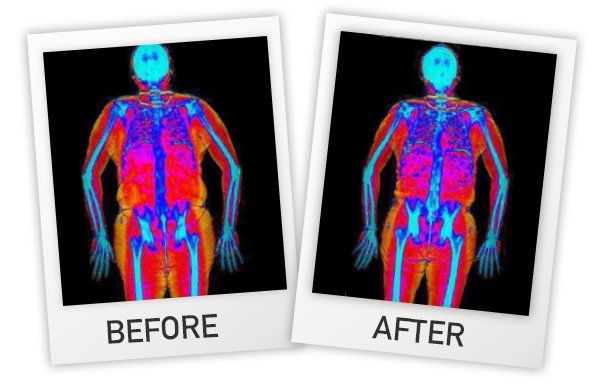Improving body composition involves reducing body fat and increasing lean muscle mass. Here’s a practical guide to help you achieve this goal:
Establish goals: Set specific, realistic, and measurable goals for your body composition. Determine how much body fat you want to lose and how much muscle you aim to gain. Planning your goals and tracking have both been shown to promote more successful outcomes (Bailey, 2019; Ingels et al., 2017). Keeping your focus on one goal is a better strategy. Building muscle in a calorie deficit while trying to reduce fat is possible, but it is far from optimal and is only likely if you have higher amounts of body fat, are relatively new to resistance training, and keep the calorie deficit modest.
Balanced nutrition: Focus on a balanced diet that includes lean proteins, complex carbohydrates, healthy fats, and plenty of fruits and vegetables. Avoid excessive calorie intake and prioritize nutrient-dense foods. Whether you are trying to lose body fat or gain muscle, consuming adequate protein and including resistance training in your exercise program is critical. For protein amounts 2g per kilogram of body weight is a good place to start. For a more optimal calculation, a DEXA scan will provide a measure of your Fat-Free Mass which can be used to individually tailor your protein needs.
Caloric deficit: To reduce body fat, create a slight caloric deficit by consuming fewer calories than you burn. Aim for a moderate deficit of 300-500 calories per day. Monitor your calorie intake through portion control and food tracking. If you’re not sure how to calculate your calorie needs, we can provide individual targets based on your body composition analysis using a DEXA scan. If you’ve had a DEXA scan with us, your calories and macronutrient recommendations are stored in your online account.
Resistance training: Incorporate regular resistance training exercises into your routine. These include weightlifting, bodyweight exercises, or using resistance bands. Volume drives muscle growth! Aim for 2-3 sessions per week and around 8 – 24 sets per muscle group, targeting all major muscle groups. A recent study demonstrated muscle growth using a wide range of repetitions provided that training was performed to volitional failure (Grgic et al., 2018), but generally, a repetition range of 8-15 for hypertrophy works well. If you are relying on body weight for your resistance training aim for the 20-30 repetition range.
Intensity is important so make sure you hit an intensity for any given set with a weight that leaves you within 2 repetitions in reserve. (Krzysztofik et al., 2019; Lopez et al., 2021). I also recommend testing your absolute failure for each given exercise regularly to see if your RIR is accurate – make sure you have a spotter for safety!
Cardiovascular exercise: Include cardio workouts to burn calories and improve cardiovascular health. Engage in activities like running, swimming, cycling, or HIIT workouts. Aim for 150 minutes of moderate-intensity cardio or 75 minutes of vigorous-intensity cardio per week. Cardiovascular exercise is important for your health regardless of the effect on your body composition and should form a part of your weekly exercise schedule (Nystoriak & Bhatnagar, 2018).
High-intensity interval training (HIIT): Incorporate HIIT workouts to boost calorie burn, increase metabolic rate, and stimulate muscle growth. Alternate between intense bursts of exercise and short recovery periods.
Monitor progress: Track your progress regularly. Take body measurements such as waist or hip circumferences and monitor relative changes in weight with a home scale in between your DEXA scans. Ideally weigh yourself first thing in the morning to standardise for any water content. Adjust your exercise and diet approach if needed based on the results. I recently scanned a client who hadn’t lost or gained any fat or lean mass in 6 months. Rather than being disappointed with the results I advised that this provided excellent information about their maintenance calories and exercise! To make changes for either fat loss or gaining muscle simply became a factor of making small changes to calorie intake based on knowing what didn’t induce any change!
Get enough rest: Allow your body sufficient time to recover and rebuild. Aim for 7-9 hours of quality sleep each night to support muscle growth and overall well-being. Poor sleep is well known to impair body composition and can make losing body fat difficult (Kline et al., 2021).
Stay consistent: Consistency is key. Stick to your nutrition and exercise plan over the long term to achieve and maintain a desirable body composition.
Remember, improving body composition is a gradual process that requires patience, commitment, and a sustainable approach. Consult with a healthcare professional or a registered dietitian for personalized guidance and support throughout your journey.
BRENDAN BARRY, (B. Clinical Exercise Physiology, ESSAM, AEP, AES)
Accredited Exercise Physiologist
Accredited Exercise Scientist


